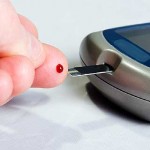Drug trial treatment for diabetes gives some positive results
 The five-year, U.S. government-backed study, presented at the American Diabetes Association meeting on Tuesday, was stopped temporarily in February 2008 because there were 20 percent more deaths among diabetics with heart problems who got intensive treatment to lower their blood sugar compared to those who were treated more conservatively.
The five-year, U.S. government-backed study, presented at the American Diabetes Association meeting on Tuesday, was stopped temporarily in February 2008 because there were 20 percent more deaths among diabetics with heart problems who got intensive treatment to lower their blood sugar compared to those who were treated more conservatively.
The patients getting the tougher treatment were transferred into the gentler group and the trial continued.
The latest long-term results show that using more drugs and adding a fibrate drug like Abbott Laboratories’ TriCor to statin cholesterol drugs did little to prevent heart problems.
But it did help prevent diabetic retinopathy, the chief cause of vision loss in working-age Americans, the study of 10,251 older diabetes patients showed.
Because intensively lowering blood sugar in some patients can increase the risk of dying from heart problems or cause episodes of severely low blood sugar, doctors need to treat every patient individually, researchers said.
“These results underscore the importance of patient-centered care that stresses individual treatment choices made in consultation with a physician,” said Dr. Denise Simons-Morton of the National Institutes of Health’s National Heart, Lung and Blood Institute, the study’s main sponsor.
The researchers on the study, called ACCORD, set out to prove what most experts had already assumed – that lowering a diabetic’s blood sugar to near-normal levels would prevent serious heart complications, a chief killer of people with type 2 diabetes.
Doctors used several combinations of drugs to control blood pressure, lower cholesterol and reduce blood sugar to a level well below the current standard of care.
 IMPROVED EYE AND KIDNEY FUNCTION
IMPROVED EYE AND KIDNEY FUNCTION
There was no difference in the risk of heart disease among those whose blood sugar was lowered to a hemoglobin A1C level of less than 6 percent, a normal level, compared with standard goals of 7 to 7.9 percent.
But patients in the intensive group did have less protein in the urine, a sign of kidney disease, and they had sharper vision and better nerve function than those who got standard care.
“Less protein in the urine is a very good sign,” said Dr. Faramarz Ismail-Beigi of Case Western Reserve University, whose findings were published in the journal Lancet.
A sub-study of 3,000 patients in the ACCORD trial by Dr. Emily Chew of the NIH, published online in the New England Journal of Medicine, looked specifically at the effect of intensive treatments for blood pressure, cholesterol and blood sugar on diabetic eye disease.
She found that diabetic retinopathy developed more slowly among people who had their blood sugar lowered aggressively and in people who got both a fibrate and a statin, compared to those who got standard treatment.
The trial is the first to show that adding a fibrate to statin treatment can cut the progression of diabetic eye disease, the team said.
Source: The Lancet online – Reuters
Filed under: Bloggin', Strange news

